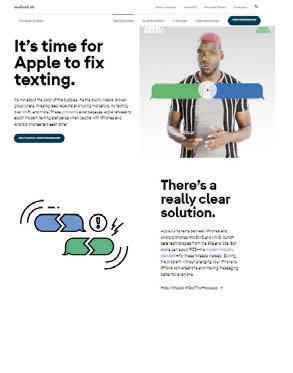
2 minute read
GOOGLE SQUEEZES APPLE ON MESSAGING LOCK-IN
from UK5G. Issue 11
GOOGLE IS TRYING TO shame Apple into opening its proprietary iMessage service and adopting RCS, the messaging stack originally devised by the mobile telco industry. “It’s time for Apple to fix texting,” is the banner of the Google-funded site, Get The Message (https://www.android. com/get-the-message/)

Advertisement

While iMessage users can exchange messages from a variety of Apple devices, the vast majority of mobile users in the world are on Android. But they are represented to iMessage users as a “green bubble”, meaning they cannot receive rich media or participate in group chats without risking mobile network charges.
Apple internally acknowledged that interoperability would “remove [an] obstacle to iPhone families giving their kids Android phones,” according to one executive. Moves to impose messaging interoperability were added to the EU’s Digital Markets Act earlier this year.
RCS was originally announced in February 2008, before Apple had even opened the Apple iPhone app store. Conscious of the poor take-up of MMS, which operators saw as a profit centre, and fearful of over-the-top messaging services, the operator industry
Fixed With Attitude
developed the RCS suite, enhancing basic SMS messaging with group chats and rich media.
The result was a complex, multi-layered specification exceeding 2,000 pages of documentation, which nevertheless did not include international interoperability – a default feature of IP-based messengers such as WhatsApp and which only came a decade later in 2018.
As a result of the flop, free-to-use IP-based messaging services such as BBM, then www.android.com/get-the-message
WeChat, WhatsApp, and Facebook Messenger proliferated, guaranteeing users interoperability and no hidden billing costs.
Google isn’t as altruistic as the marketing campaign suggests. It effectively took control of the RCS specifications three years ago, and RCS messages now run through Google’s servers. It also follows years of failure as Google launched successive over-the-top messaging clients: GTalk, Google Voice (with its own messaging client), Hangouts, Allo, and Duo all failed to impact the market.
RCS was incorporated into its Android messaging client in 2019 (as optional “chat features”) and gained end-to-end encryption (E2EE) for 1:1 conversations last year. But beware: RCS is now a proprietary Google service, Ron Amadeo at technology publication Ars Technica pointed out: the only third party allowed to integrate with it is Samsung, thanks to a private agreement.
“Other than Google being desperate for one of the few messaging solutions it hasn’t exhausted with mismanagement, there’s no clear argument for why RCS is worth this effort,” he wrote. Amadeo joined calls for Apple and Google to work together on an entirely new standard.
An uptake in the niche practice of using mobile networks to replace cable or DSL has prompted Barclays to downgrade expectations of the share prices of US cable operators. Such offerings are called FWA, or fixed wireless access, and Three first launched 5G in the UK as a domestic FWA broadband package, rather than an upgrade for mobile phone users.
US mobile operator T-Mobile added more FWA customers in the most recent quarter than Comcast or Cable expect to add in the entire year. Additions in the fixed line market are largely fuelled by house moves. The additions are lower than expected, and the FW additions higher than expected. Barclays Group media analyst Kannan Venkateshwar was one analyst to adjust his equity ratings.
T-Mobile USA added 560,000 fixed wireless subscribers in Q2, far exceeding consensus expectations. Shipments of FWA modems are expected to double in 2022 to 3.6 million, according to the GMSA, although today most remain 4G only.
The prediction is based on a survey of vendors. Almost one in ten US households may be using FWA as their main broadband connection by 2026, according to analysts Global Data.










